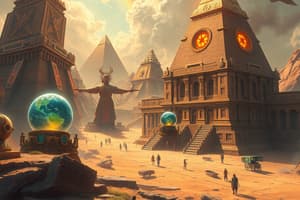Podcast
Questions and Answers
What was the purpose of the House of Wisdom in Baghdad?
What was the purpose of the House of Wisdom in Baghdad?
- To be a center for religious studies
- To collect and translate manuscripts from Islamic and non-Muslim scholars (correct)
- To promote scientific research only
- To serve as a royal palace
Abdul Rahman al-Sufi was the first to write about astronomy.
Abdul Rahman al-Sufi was the first to write about astronomy.
True (A)
Who is considered the 'Father of Algebra'?
Who is considered the 'Father of Algebra'?
Al-Khwarizmi
Al-Jazari is known for inventing a water-conveying machine and Ibn Haytham created a mechanical ___________ clock.
Al-Jazari is known for inventing a water-conveying machine and Ibn Haytham created a mechanical ___________ clock.
Study Notes
Emergence of Science in the Arab World
- The rapid spread of Islam challenged the two superpowers of the time, the Byzantine Empire and the Neo-Persian (Sassanian Empire), leading to significant developments in knowledge.
- The impact of Islam on the development of knowledge was immense, allowing for the growth of science and technology.
Continuity of Science Development
- Mesopotamia, with its cities of Sumer, Ur, Uruk, and Babylon, achieved remarkable scientific feats, including:
- Inventing the wheel
- Standardizing weights and measures
- Building ships that could cruise long distances
- Ancient Egypt, founded by Mesopotamians, developed:
- The sundial (sun clock)
- The pyramid
- Papyrus as a writing material
- The Greek legacy had a significant impact on Islam, introducing:
- Philosophers and scientists
- Scientific reasoning and observational methods
- Achievements in mathematics, geometry, and astronomy
Translation as a Source of Knowledge
- The peak of translation occurred during the era of Caliph al-Ma'mun, with high fees paid in gold to translators.
- Translation was essential for preserving and expanding knowledge.
Centers for Scientific Development
- Baghdad (Abbasid Empire):
- House of Wisdom (Baitul Hikmah), the first systematic and comprehensive library
- Intellectual activities included collecting, translating, and compiling manuscripts
- Damascus (Islamic Kingdom):
- Madrasah al-Shauhiyyah, a center for teaching four law schools
- Leadership of Salahuddin al-Ayyubi, who established 20 schools and gathering places for Sufis
- Cairo (Fatimid Dynasty):
- Al-Azhar Mosque, a continuous Islamic university
- Enhanced from a place of worship to a university during the caliphate of al-Aziz
- Cordova (Umayyad Dynasty):
- Universities in major cities and schools in small towns
- Mosques reserved as learning centers
- University of Cordova, a premier center of study and culture for Muslims, Christians, and Jews
Four Main Fields of Scientific Development
Medicine
- Hunayn Ibn Ishak:
- Translated over 100 books from Greek and Suryani into Arabic
- Director of Baitul Hikmah
- Al-Razi:
- Wrote 200 medical books, including works on smallpox, measles, and al-Hawi
Astronomy
- Abdul Rahamn al-Sufi:
- First person to write about astronomy
- Catalogued over 1000 star types used in the West
- Al-Zarqali:
- Created many astronomical tools
- Invented the water clock to show day and night
- Organized names of days for each month
Mathematics
- Islamic mathematicians focused on the decimal system, using:
- Alphabetic system with Arabic letters
- Indian-Nomenclature system
- Al-Khwarizmi:
- Father of Algebra
- Introduced common symbols to represent numbers
- Other developments:
- Geometry, studying lines, shapes, and spaces
- Applications in astronomy, architectural art
Engineering
- Al-Jazari:
- Invented the water-conveying machine
- Ibn Haytam:
- Created the mechanical water clock
- Other developments:
- Irrigation systems in agriculture
Studying That Suits You
Use AI to generate personalized quizzes and flashcards to suit your learning preferences.
Related Documents
Description
This quiz covers the emergence of science in the Arab World, the continuity of science development in Mesopotamia and Ancient Egypt, and the impact of Islam on the development of knowledge.




